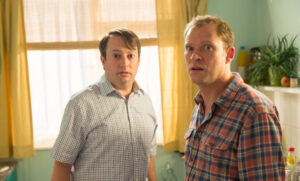If Damon Albarn was telling the truth, and Saturday’s Coachella performance was Blur’s “last gig”, it was a miserable swansong. A field of influencers (some of whom appeared to not know who Blur are) crowded into the most corporatised festival in the world, all to turn it into sponsored TikTok content. It’s exactly the sort of scene that Nineties Albarn would have written a scornful observational pop song about.
While Blur may be doing better in their home country — they sold out Wembley last year — to most of my generation, they are essentially a sad nostalgia act. Rarely have a band’s glory days been so inseparably tied to such a derided historical moment: the “Britpop” movement and its demographic derivative “Britpopper” now represent an abyss of cringe.
For Britpop was co-opted by that generation of British late-boomers who parlayed the end of history, their demographic glut and unique economic fortune into a series of foolhardy political conceits. Long before he invited Noel Gallagher to Downing Street, Tony Blair was having meetings with Damon Albarn in the Palace of Westminster. Soon enough the former lead singer of Ugly Rumours was saying things like: “Rock’n’roll is not just an important part of our culture, it’s an important part of our way of life”. Unfortunately, the heady cultural and intellectual optimism of that period can’t be seen as anything but complacency now.
As we see it, this lot valorised the liberalism that bore fruits for them, and sat on their hands as it rotted away. They fashioned a social-democratic aesthetic, and then forgot to build the social democracy. And they are consequently held responsible for a grab-bag of important and trivial mis-steps: New Labour, the Iraq War, the Olympic opening ceremony, the People’s Vote campaign and The Rest is Politics. This folk history of the Nineties does have a seductive simplicity, useful for young gadflies on Left and Right to caricature the decade, a way of chronologically tethering their competing attacks on Blairism. And it’s helped along by the fact that politics and culture did seem to align in that moment.
And yet, while Britpop certainly was gleeful at the prospect of political change, it also knew full well the problems it was running away from. Blur’s Parklife in particular, which celebrates its 30th birthday today and which was inescapable in that summer of 1994, is striking for how much of the Nineties mood it managed to get right at the time. Rather than a straightforward celebration, it sounds, now, like a melancholic critique of the period to which it also served as soundtrack, a record of the atomisation and anxiety that had already begun to seep into society.
It’s reputation for care-free Cockney smugness is a product of the popularity of its title track — and Blur did occasionally over-indulge the musical style which Gallagher brothers called “Chas & Dave chimney sweep music”. But the rest of the tracks conjure a completely different mood: “Badhead”, “To the End”, “This is a Low” and “End of a Century”… So much of Albarn’s song-writing was drawing from a well of existential despair, his lonely characters drinking too much and cycling through American TV channels, stuck in apathetic or crumbling relationships. Already he was diagnosing the boredom and stasis we sometimes think particular to 21st-century life. And it is telling that he suffered from crippling panic attacks in the weeks immediately after Parklife’s release, bowled over by the force of getting everything he’d always wanted.
But these tracks are overshadowed by a grander project: Parklife’s nauseous portrait of modern life, a social diagnosis that Albarn and his cheerleaders went as far as to label a “manifesto” for modern England. Interviews from the time reveal his narrative of the recent past to be full of decline and decay. Post-Thatcher, “a whole new culture developed and old England died away… The American shopping malls landed in England, first in Essex. It was just awful to look at, like a spreading cancer…” And his songs are the stories of “characters living in this environment” and yearning to escape it — like Tracy Jacks, the civil servant who dreams of streaking on Walton Beach. Albarn called it “music for whistling in the dark”.
The influence of Martin Amis’s London Fields has often been noted — not least by Albarn himself, who at the time painted himself as something of a Lad-lit troubadour. And he certainly inherits Amis’s scathing condescension, and his propensity for turning flesh and blood into a comedy cartoon. The album’s biggest hit, “Girls & Boys”, was written after a holiday to Magaluf, during which Albarn witnessed the emergence of Houellebecqian sexual scene, which clearly perturbed even if it did not offend. “There’s a very strong sexuality about it. I just love the whole idea of it, to be honest. I love herds. All these blokes and all these girls meeting at the watering hole and then just… copulating. There’s no morality involved, I’m not saying it should or shouldn’t happen. My mind’s just getting more dirty.”
Albarn’s exact class relationship to this milieu was fiercely contested, especially by more true-born working-class peers. Initially, he had talked up Parklife as a concept album — “the travels of the mystical lager-eater”, a spin on Amis’s cast of low-life flaneurs. And at various stages the album was to be titled London, Sport or Soft Porn. But, soon after release, Albarn seemed determined to actually become such a figure. He held the album’s launch party at Walthamstow Dog Track (“you get the ooze of life there”, he said). And he was soon saying things like, “I started out reading Nabokov and now I’m into football, dog-racing and Essex girls,” as comfortable in an East End boozer as he was in the student union. The reality was that Albarn was always a lower-middle bohemian, not a working-class hero. He was accompanied on his fact-finding trips to Magaluf by his St Paul’s alumna girlfriend, Justine Frischmann. And his life in Essex was characterised not by dog-racing but by art school and the kind of cultured, post-Sixties homestead where he called his parents by their first names.
These contradictions of Albarn’s perspective — that of the mordant satirist-voyeur and the enthusiastic participant — do work in his favour. They lend his songs a scope that allow him to capture both ends of the Nineties. This reaches a climax on Parklife’s masterpiece, “This is a Low”. Framed through a cycle of lyrics based around Radio 4’s Shipping Forecast, the song is something of a mournful state-of-the-nation ballad. But its background account of a forgotten traveller on some twilit homeward journey (“Hit traffic on the Dogger bank/Up the Thames to find a taxi rank”) lend it a more wretched and introspective mood.
This isn’t triumphant Cool Britannia. It’s about as far from “Things Can Only Get Better”, or indeed Coachella bubble-gum, as you’re going to get, not least because it predates Britpop’s co-option by an expedient Labour Party and greedy A&R. But if we can accept that Albarn was capable of seeing behind the Nineties’ veil, perhaps we can also begin to reinterpret my generation’s received narrative of the decade.
Rather than a last party busted by Columbine or September 11, for some the Nineties was the decade that parts of popular culture became aware of the sheer flatness of life after the great political battles of the Eighties. Part of this related to globalisation — and the music hall carry-on of Blur’s aesthetic universe was a conscious rebuttal of the creeping Americanisation they observed around them. But it also related to a distinct historical moment in Britain itself.
Like Blair, Britpop had an ambiguous relationship with the Thatcher era that preceded it. Its subject matter — its commodity — was Thatcherism’s devastation. From their own corner of the wasteland, Blur, Pulp and Suede wrote about what they saw: lonely suburbs, remorseless yuppies and small-town drug abuse. Oasis, the most musically populist of the Britpop elite, admittedly traded in the headless euphoria of escape and renewal. But this only resonated because it was a dream, a dole-queue fantasy, that so many others could recognise. And yet, Britpop was ultimately to be consumed by the very forces that set it in motion. The first truly commercialised indie scene, they pursued popularity and market share without shame, allowing punk-ish taboos about “selling out” slide. “We were all Thatcher’s children, who got off our arses and did it for ourselves,” says Noel Gallagher, sounding every inch the barrow boy who “got on his bike”.
Perhaps that’s why the Nineties generation is so easy to resent. They bore witness to the arrival of the society that we still live in, but were either powerless to change it, or more than happy to swim with the tide. The music, though, stands as testament to the fact that the contradictions of the decade were being registered on some level. The Britpoppers may have quickly become consumed by illusions of the new millennium, some of them embarrassingly to this day. But that doesn’t change the fact that some of them also gave voice to a world that had lost something — something which is still missing now.
Disclaimer
Some of the posts we share are controversial and we do not necessarily agree with them in the whole extend. Sometimes we agree with the content or part of it but we do not agree with the narration or language. Nevertheless we find them somehow interesting, valuable and/or informative or we share them, because we strongly believe in freedom of speech, free press and journalism. We strongly encourage you to have a critical approach to all the content, do your own research and analysis to build your own opinion.
We would be glad to have your feedback.
Source: UnHerd Read the original article here: https://unherd.com/



